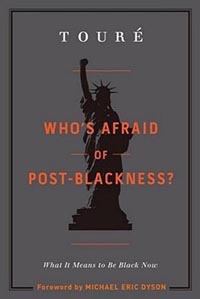Campus News
UCSC art historian contributes to Touré’s new book on “post-blackness”
History of Art and Visual Culture assistant professor Derek Conrad Murray adds to candid conversation about race in the age of Obama


Who’s Afraid of Post-Blackness? is a provocative new book by MSNBC correspondent, and Rolling Stone contributing editor Touré about what it means to be black in America today.
Inspired by Obama’s presence in the White House, Touré expands upon the idea of “post-blackness”—a term originally coined in the art world to describe artists who make art about the African-American experience, but don’t want the scope of their work to be restricted by their racial identity.
The book includes both irreverent and painful stories of race and racial expectations—culled from interviews with 105 luminaries, including Cornel West, Henry Louis Gates Jr., Michael Eric Dyson, Malcolm Gladwell, Paul Mooney, New York Governor David Paterson, Soledad O’Brien, Kamala Harris, Chuck D., and a host of others.
It also includes a couple of very personal accounts, plus several insightful comments from Derek Conrad Murray, an assistant professor in UCSC’s History of Art and Visual Culture Department.
“In the black community, you can be excommunicated for not being black in the proper way,” said Murray recently in his office at UCSC’s Digital Arts Research Center.
“Part of Touré’s argument, for example, says that (Supreme Court Justice) Clarence Thomas, in his politics, may do things that hurt the African-American community, but our distaste for his policies ultimately does not invalidate his blackness.”
Murray added that many African-Americans who grew up in privilege—or who have a certain type of education—are frequently thought of as not wielding blackness in a way that’s “authentic.”
“The often-mythologized urban, inner-city stereotypes of black life are considered more authentic,” said Murray. “So what Touré is doing in the book is trying to debunk this—it’s a discussion that needs to happen among black people…and beyond.”
Early in the book, Touré shares a reflection by Murray that personifies this new concept of black identity with infinite possibilities.
“Both my parents grew up in segregation and there was a dogmatic transference of trauma,” said UC Santa Cruz professor Derek Conrad Murray. “Like they had this experience and it was my obligation to take that trauma that they experienced and basically keep that flame alive. It reminds me of some of my Jewish friends talking about being indoctrinated into this kind of trauma narrative of survivorship and thinking of themselves as survivors of the Holocaust. I think that happens in a lot of Black households. There’s this mandate that we have to feel this kind of trauma and then carry that with us through our lives. And we honor the history of the struggle of Black people in America but we still want to construct our own notion of Blackness that is separate from that of our parents and grandparents.”
Murray’s research in the history of art and visual culture is focused on identity issues and the weight political movements have on younger generations.
He noted that although young artists are the beneficiaries of the struggles of people before them, they often have trouble stepping out from past movements and capturing the spirit of their own time.
“When I met with Touré, I found we had similar upbringings—we were both brought up in a middle class background and both struggled with charges of a lack of authenticity,” Murray noted.
“With academics like myself there’s a kind of invisibility, unless you’re like Cornel West,” he added. “But when students see you, it goes against expectations and broadens their horizons. I think you change things, one student at a time.”
Murray is currently working on a project about women photographers born in the 1970s and dealing with the notion of post-feminism–“young women born in the second wave of feminism who are thinking intellectually and visually about what it means to be a woman without the politicalization of the previous generation.”
Now in the research phase, Murray said he plans to curate a future exhibition of works that exemplify this emergent movement in photography.